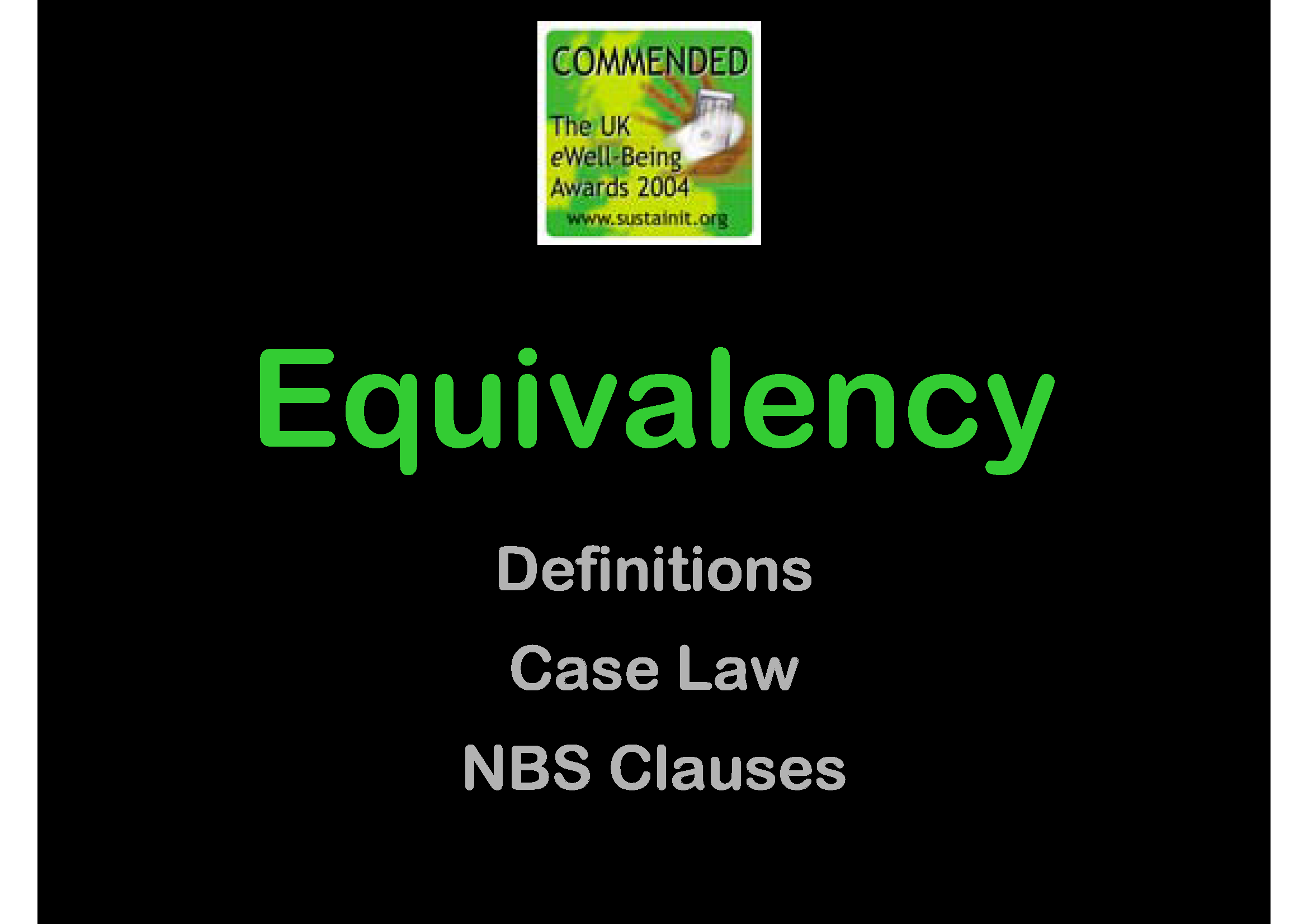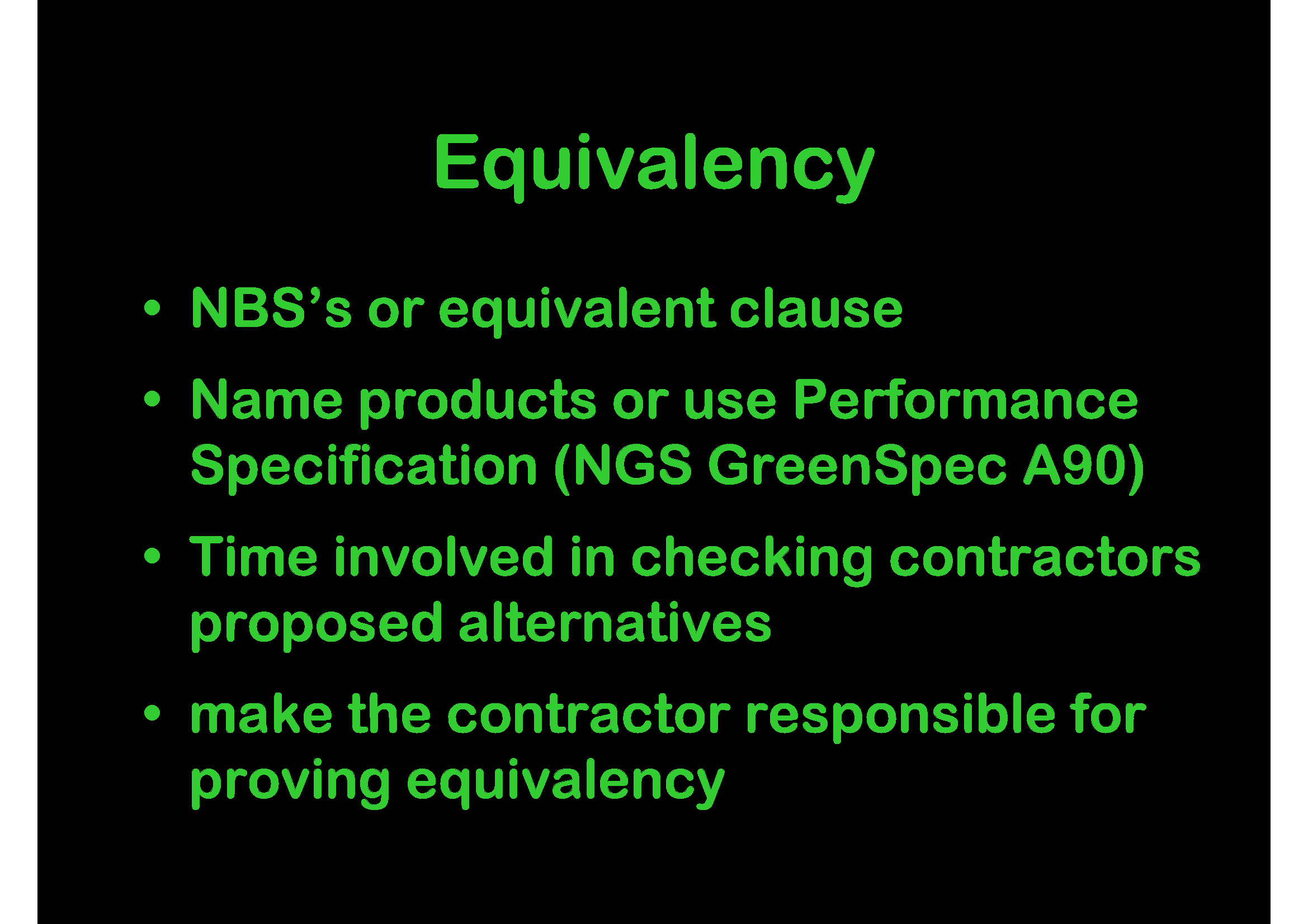
Or Equivalent Jargon Buster
GBE > Encyclopaedia > Code > Jargon Buster > Entries > O > G#988 N#1009
About:
Quality
“There is hardly anything in the world that some man cannot make a little worse and sell a little cheaper, and the people who consider price only are this man’s lawful prey.”
John Ruskin (1819-1900)
With the growth in Design and Build, Construction Management, Management Contracting and their many hybrids, I have seen changes in specification practice, which are eroding the position of the designer and the quality of the end building. Increasingly the requirements and methods of these procurement methods have filtered their way back to General Contracting and it has become more commonplace for Contractors to offer alternative products to those specified, usually offering potential savings.
If there is a project budget or cost plan for the building and tenders are within these figures then there should be no need to consider alternatives. Potential savings may be offered but it will be up to the QS, if there is one, to ensure the savings find their way to the final sum not just the contractor’s profit margin.
‘Or Equivalent Approved’
Since 1956 LEEDSFORD V CITY OF BRADFORD Case law the use of the term ‘or otherwise approved’ in a specification does not mean the designer must consider alternatives offered by the contractor, nor that the designer must give a reason for not considering alternatives offered.
Many European Directives and their implementing national legislation, in particular the Construction Products Directive (CPD) and the Building Regulations (Regulation 7) were published or updated in the years leading up to or following 1992 when the United Kingdom formally joined the European Market.
Whilst the terms ‘or similar’ & ‘or equal’ were in common use for decades leading up to 1992, the term ‘or equivalent’ began to have greater significance in European Law and in particular related to government financed ‘Public Works’ projects.
Terminology
The term ‘or equivalent’ was in use in standard specifications in particular in PSA General Specification and NBS National Building Specification Preliminaries.
OR OTHERWISE APPROVED did not suggest equivalency,
OR SIMILAR is a weak term by comparison with ‘or equal’ and should be avoided,
OR EQUAL sounds okay and is okay in UK on non-government projects,
OR EQUIVALENT has greater meaning in EU legal definitions, in EU directives and the UK national legislation implementing them. It is required on all Government financed ‘Public Works’.
But OR EQUIVALENT can mean same performance but a different way to achieve that performance,
e.g. roof slate v clay tile, so its also important to control appearance and profiles too.
OR EQUIVALENT AND APPROVED is not strictly necessary but a useful reminder and APPROVED needs also to be defined, it is in NBS preliminaries.
here be dragons
However OR EQUIVALENT AND APPROVED can be problematic when a contractor substitutes without the CA’s knowledge and the CA signs-off stage payments for work containing substituted and potentially inadequate materials, is effectively approving the inadequate materials without knowing it.
So its back to OR EQUIVALENT and no more.
The term ‘or equivalent’ needs definition and ground rules and NBS Clause A31/200 does just that. It requires any proposed substitutions to be notified to the Contract Administrator (often but not always the Architect) submitting evidence in the form of English language test results, certificates, specifications, details, guarantees, etc. These must show equivalency of materials, safety, reliability, appearance, durability, function, of products and all accessories, etc.
WREN PII Insurance
- BrianSpecMan hears through providing GBE In-House CPD that Specifiers are required to state ‘Or equivalent’ in every product clause in government work.
- This encourages substitution and is read by contractors as permission to substitute and substitute surreptitiously.
- We think this is a dangerous precedent that will undermine the specification and potentially reduce the quality of the building, but comply with EU rules as interpreted by insurers interpreting case law.
© GBE GBC GBL NGS ASWS Brian Murphy aka BrianSpecMan **
2003 – 27th July 2013 – 11th August 2021
Images:
GBE CPD
- Equivalency PDF Show


© GBE GBC GBL NGS ASWS Brian Murphy aka BrianSpecMan **
3rd March 2013 – 11th August 2021
See Also:
GBE CPD
- Equivalency PDF Show
GBE Jargon Buster
- 1992
- BBA Certificates
- BLP CLM
- BSI Kitemark
- BRE Certification Technical Approvals (formerly WIMLAS)
- Building Fabric Component Life Manual (BFCLM)
- Building Performance Group (BPG)
- Building Regulations (Regulation 7)
- BWF Certifire
- CA Contract Administrator
- CARES
- CDM Risk assessment
- CE Mark
- Component Life (CL)
- Component Life Assessment
- Component Life Manuals (CLM)
- Construction Management
- Construction Products Directive (CPD)
- COSHH data sheet review
- Design & Build
- Design Life
- Drawings
- Embodied energy
- Employer’s Requirements
- Environmental assessment
- Euro-Agrément
- European Directives
- European Market
- European National Agrément Schemes
- European Technical Approvals (ETA)
- Expected life
- General Contracting
- GBS Robust Specification
- Housing Association Property Mutual (HAPM)
- Insurable life
- Life Cycle Analysis (LCA)
- Life Cycle Costing
- Maintenance requirements
- Management Contracting
- Manufacturer’s illustrative and technical literature
- Method statements
- Modes of failure
- NBS National Building Specification Preliminaries
- Or similar
- Or equal
- Or equivalent (this page)
- Or Equivalent Approved
- OR EQUIVALENT AND APPROVED
- Or otherwise approved
- Performance characteristics
- PII Insurance
- Product Quality
- Proper materials
- PSA General Specification
- Public Works
- Quantity Surveyor (QS)
- QS Quantity Surveyor
- Quality
- Quality Assurance
- SGS Yarsley Testguard
- Specification
- SPON
- Substitution
- Surreptitious Substitution
- Test results and/or assessments
- Third party independent accreditation
- UKCA Mark
GBE CPD
- Quality
- Procurement Methods
- Proper Materials
- Substitution
- Surreptitious Substitution
GBE Collaborator Services
© GBE GBC GBL NGS ASWS Brian Murphy aka BrianSpecMan **
10th February 2013 – 11th August 2021

